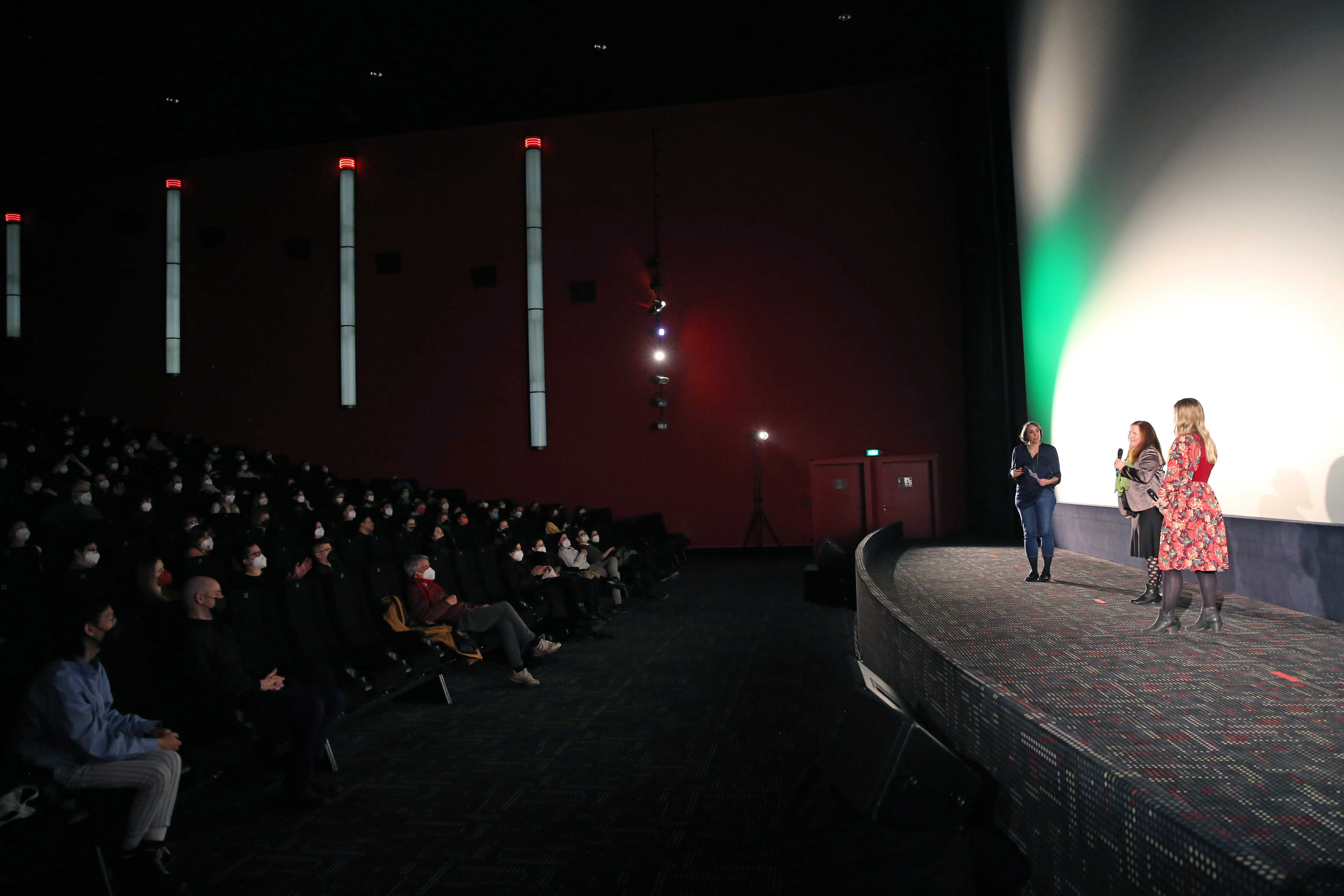Press reviews for „Dirndlschuld“ by Wilbirg Brainin-Donnenberg.
„Two other documentaries in the section also deal with war, memory and reality. Dirndlschuld by Wilbirg Brainin-Donnenberg (Austria) is an absorbing personal work that deals with memories of how the dirndl traditional folk dress was used as a tool of oppression in the run-up to World War II, with Jews and others being forbidden from wearing it.“
mention by Laurence Boyce for Cineuropa
„Auch historische Perspektiven finden sich im Shorts-Programm, etwa in „Dirndlschuld“ und „Memories from the Eastern Front“, zwei Dokumentationen, die sich auf sehr unterschiedliche Arten mit der NS-Zeit in Europa auseinandersetzen. Im farbenfrohen Super-8 Film „Dirndlschuld“ verhandelt die österreichische Regisseurin Wilbirg Brainin-Donnenberg das Thema Schuld anhand eines Dirndlkleids, das sie als Kind trug, aber später nicht mehr anziehen wollte.“
review by Hanno Rehlinger for Der Tagesspiegel
„In „Dirndlschuld“ steckt die Regisseurin Wilbirg Brainin-Donnenberg ihre erwachsene Tochter ins Trachtenkleid. Sie will endlich herausbekommen, was es mit diesem geliebt-gehassten Kleidungsstück auf sich hat. Am Grundlsee – dem traditionellen Familienort der Familie – inszeniert sie ihren filmischen Super-8-Exorzismus. Nein, es gibt keine unschuldigen Kleider. Alles ist noch da. Unter der lustigen Schürze steckt der Familienmief aus den
1000 Jahren von 1938 bis 1945. Doch der Film vermag auch loszulassen. Er tut dies
sehr klug, mit sanfter Ironie, die sich nicht zuletzt in die Form einschreibt. Gab es in der Filmgeschichte je schon einmal gestickte Start- und Endtitel?“
review by Claus Loeser for Berliner Zeitung
„On the one hand, a dirndl is just a pretty, colorful dress with an apron – the typical folk costume worn by women in the German-speaking alpine region. On the other hand, Wilberg Brainin-Donnenberg’s short film “Dirndlschuld“ (Dirndl Guilt) shows us that the dirndl can also be contaminated, politicized form of clothing. The narratives constructed around the dirndl are constantly changed and adapted by private family histories and historical circumstances – and with each generation, a new reading is superimposed on these layers. This Super 8 film dives deep down into the idyll of Austria’s Lake Grundlsee to reveal the chasms that lie beneath. Who would have known before watching this film that the Nazis actually banned Jewish women from wearing the dirndl?“
review by Yossi Lempkowicz for European Jewish Press
„I associate the Dirndl overwhelmingly with beer: big, steaming, frothing vats of Helles lager served in gigantic litres in the beerhalls of Munich by old, no-nonsense ladies. But as Dirndlschuld shows, this seemingly innocuous, albeit cleavage-bearing, item of clothing has a darker legacy: according to Wilbirg Brainin-Donnenberg’s testimony, composed of narration over old film stills, Jews in Austria were banned from wearing this archetypical dress, used as a propaganda tool to advance the superiority of the master race. Digging deep into her own family’s racist past, it uncovers the fascinating symbolism of such clothing, as well as the trickiness of separating image from meaning.“
review by Redmond Bacon for Directors Notes
„Unsere Erinnerung klammert sich nicht nur an Personen und Ereignisse, sondern verknüpft sie immer auch mit Orten. Welche Narrative, welche historischen Ereignisse und heimlichen Familiengeschichten sich um einen Ort spinnen, machen für die einen jenen Ort zur Hölle auf Erden, für andere wiederum wird er zum Paradies. „Dirndlschuld“ beleuchtet im Super-8-Format das Idyll des österreichischen Grundlsees und seine mitunter tiefen Abgründe.“
review by Wiebke Jann for MitVergnügen
„When Wilbirg Brainin-Donnenberg’s narration begins over glimmering celluloid images of Lake Grundlsee in Austria, the impression given is that of someones sharing their holiday photos. She recounts her husband’s desire to return to this picturesque vacation spot every year and her own love of swimming in the chilly water.“
review by Ben Nicholson for The Film Veredict
„Tourné en Super 8 comme si l’on exhumait de vieux souvenirs, Dirndlschuld de l’Autrichienne Wilbirg Brainin-Donnenberg est un exercice fascinant qui se rapproche de plus en plus du présent, passant de la carte postale désuète à une réalité grinçante.“
review for Le Polyester
„Wilbirg Brainin-Donnenberg weist auf die zwiespältigen Gefühle hin und öffnet den Blick, der zum Nachdenken anregt.“
article by Elisabeth Nagy for Riecks Film Kritiken
„Neben den eher verklausulierten Kurzfilmen, gab es auch viele, die stark im Dokumentarischen verhaftet sind. Dabei stechen natürlich die beiden Filme „Dirndlschuld“ von Wilbirg Brainin-Donnenberg sowie „Memories from the Eastern Front“ von Radu Jude (Gewinner der letztjährigen Berlinale mit seinem Film „Bad Luck Banging or Loony Porn“) heraus. Der erste arbeitet dabei mit persönlichen Videomaterial und erläutert in einem essayistischen Voice-Over die Bedeutungsebene und die persönliche Geschichte.“
review by Doreen Matthei for Testkammer
find updates on „Dirndlschuld“ on letterboxd
Find interviews with the director here.
Photo © Dorothea Tuch

